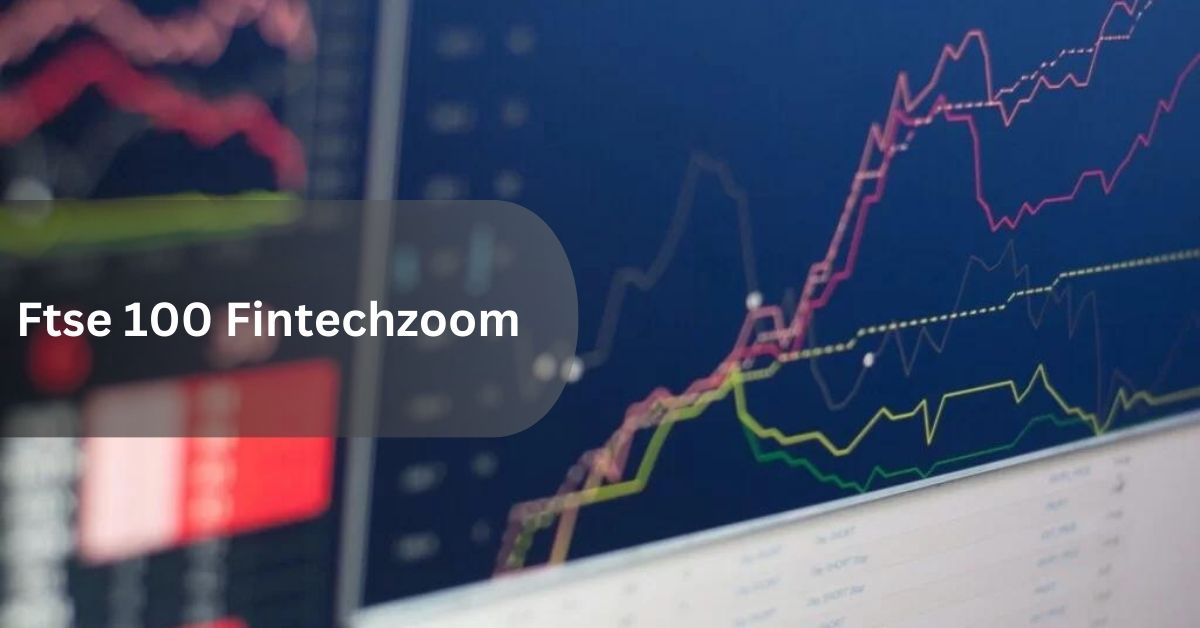Ftse 100 Fintechzoom – The Overall Details at One Stop!
Having navigated the twists and turns of market trends, I’ve witnessed firsthand the rise of groundbreaking technologies and the transformative power of Fintech companies listed on the London Stock Exchange.
FTSE 100 Fintechzoom is an exciting blend of top UK companies revolutionizing finance. It represents the 100 largest firms listed on the London Stock Exchange, showcasing the impact of fintech innovations on the market.
Join me as I unravel the layers of this thrilling sector, sharing insights gained from my exploration of the FTSE 100 Fintechzoom landscape.”
A Brief Introduction on ftse 100 Fintechzoom – Unveil The Future of Finance!
Step into the dynamic realm of FTSE 100 Fintechzoom, where innovation meets financial prowess. The FTSE 100, representing the crème de la crème of companies on the London Stock Exchange, is your gateway to the heartbeat of the UK stock market.
Amidst this elite group, the term “Fintechzoom” encapsulates a fascinating convergence of finance and era spearheaded via Waymeans of a number of the most influential gamers within the industry.
In essence, FTSE 100 Fintechzoom serves as a barometer for the evolving financial technology landscape. These 100 companies, carefully selected based on market capitalization, wield significant influence over the market; their fortunes are interwoven with the technological advancements shaping the financial sector. It’s not merely an index; it’s a narrative of how traditional finance meets the cutting edge.
As we delve deeper into this financial tapestry, you’ll discover the impactful presence of renowned institutions like Barclays and HSBC and innovative disruptors like Revolut, each contributing to the sector’s vibrancy.
The FTSE 100 Fintechzoom isn’t just a snapshot of the present; it’s a compass pointing towards the future of finance. Join this journey, explore the trends, grasp the opportunities, and witness firsthand the evolution defining the financial landscape.
What is LSE? – Know the Term in Broad!
Delving into the intricate web of global finance, the London Stock Exchange (LSE) stands as an unparalleled institution, shaping the very foundations of the financial world. Established in the heart of London, England, the LSE is not just a marketplace; it’s the nucleus where more than 3,500 companies from around the globe converge to facilitate the buying and selling shares, bonds, and other financial instruments.
Regulated by the Financial Conduct Authority (FCA), the LSE is a pivotal player, setting the pace for stock exchanges worldwide. Its Main Market serves as the primary platform for listing companies, showcasing giants like British American Tobacco, GlaxoSmithKline, HSBC, BP, and Unilever among the illustrious constituents of the FTSE 100 Index.
Additionally, the Alternative Investment Market (AIM) provides a fertile ground for smaller, more speculative enterprises, fostering a diverse ecosystem within the LSE. Navigating the LSE is akin to deciphering the pulse of global financial dynamics. The index updates every 15 seconds, capturing the ebb and flow of market forces.
Investors, business owners, and financial enthusiasts are drawn to this epicentre of economic activity. It’s not just a marketplace; it’s a stage where companies perform, investors strategize, and the world watches the intricate dance of financial evolution.
The Key Takeaways of FTSE 100 – Essential Insights for Investors!
Embarking on the FTSE 100 journey unveils a multitude of critical takeaways that resonate with investors seeking to decipher the pulse of the UK stock market. Here are the pivotal insights to guide you through the intricacies of this influential stock index:
Benchmark of Performance: The FTSE 100 is a benchmark at its core, reflecting the performance of the top 100 companies listed on the London Stock Exchange (LSE). These companies span various sectors, including finance, healthcare, retail, and technology, providing a comprehensive snapshot of the UK’s economic landscape.
Composition and Weightage: The composition of the FTSE 100 is a dynamic tapestry of market capitalization, where larger companies exert more influence. Constituents are revised quarterly, with companies entering or exiting based on market performance. As of the latest review, notable members include British American Tobacco, GlaxoSmithKline, HSBC, BP, and Unilever.
Influence on Market Sentiment: Investors keen on understanding market sentiment turn to the FTSE 100 as a reliable indicator.
The index’s performance is intertwined with broader economic trends, geopolitical events, and industry shifts. Its movements ripple through the financial landscape, impacting seasoned investors and those navigating the markets for the first time.
Global Implications: Beyond the borders of the United Kingdom, the FTSE 100 wields global significance. Its movements resonate in international financial markets, influencing investment decisions and strategies worldwide. As such, it’s not merely a domestic index but a global player with implications extending far beyond its home market.
What Does Fintechzoom Offer for FTSE 100 Insights?
Fintechzoom specializes in providing real-time data, in-depth market analysis, and expert opinions for those following the FTSE 100. The platform aggregates financial news, breaking market updates, and expert commentaries, helping users make sense of the complex world of stock indices.
For FTSE 100, Fintechzoom delivers insights into how global events, policy changes, or earnings reports impact the index. Additionally, Fintechzoom’s tools allow users to create customized watchlists and receive personalized notifications on FTSE 100 movements.
How are FTSE100 and Fintechzoom related to each other? – Uncover The Financial Ecosystem!
In the intricate tapestry of financial markets, the relationship between FTSE 100 and Fintechzoom is a compelling narrative where traditional indices meet the disruptive forces of fintech innovation. FTSE 100, representing the crème de la crème of the London Stock Exchange (LSE), is a testament to the performance of the UK’s top 100 companies.
On the other hand, Fintechzoom, a dynamic platform, serves as a gateway to the latest updates and insights into the fintech industry, encompassing groundbreaking developments in financial technology.
The intersection of FTSE 100 and Fintechzoom reflects the evolving landscape of the financial sector, where established giants and fintech trailblazers converge. The FTSE 100 Index, a diversified portfolio of companies spanning various sectors, includes prominent players from traditional finance and technology.
Noteworthy constituents like Barclays, HSBC, and other significant banks coexist with fintech innovators, creating a unique blend of financial prowess within the index. Fintechzoom acts as a lens through which investors and enthusiasts can witness the symbiotic relationship between traditional finance and fintech within the FTSE 100.
The platform unveils the growth trajectory of fintech companies embedded in the index, showcasing their market value, innovation, and contributions to the financial ecosystem. As the fintech revolution reshapes the industry, Fintechzoom becomes the bridge connecting curious minds to the dynamic interplay between the stalwarts of the FTSE 100 and the disruptors propelling the fintech sector forward.
The synergy between FTSE 100 and Fintechzoom encapsulates the coexistence of tradition and innovation in the financial realm. It invites exploration into how established financial institutions and cutting-edge fintech enterprises collaborate, compete, and collectively shape the future of finance.
Components Connected to FTSE 100 Index – Discover Now!
Embarking on a detailed exploration of the FTSE 100 Index involves unravelling the intricate web of its constituent companies, each weaving its unique thread into the market tapestry. The components of the FTSE 100 are the heartbeat of this index, collectively influencing its movements and reflecting the diverse sectors that form the backbone of the UK economy.
1. Market Capitalization Dynamics:
The FTSE 100 Index is not a static entity but a dynamic reflection of market capitalization. Based on market capitalization, the most prominent companies wield considerable influence over the index’s values. This dynamic nature ensures that investors witness the ebb and flow of market forces, with changes occurring quarterly as companies are added or removed based on their performance.
2. Quarterly Revisions and Market Trends:
The components of the FTSE 100 undergo a meticulous evaluation during quarterly revisions. This process, driven by performance and market capitalization metrics, encapsulates the ever-evolving nature of the financial landscape. As certain companies ascend to prominence, others may recede, mirroring the cyclical nature of market trends.
3. Noteworthy Constituents:
Among the noteworthy constituents are stalwarts like British American Tobacco, GlaxoSmithKline, HSBC, BP, and Unilever. These companies, representing various sectors, showcase the index’s diversity. Their market positioning and performance play a pivotal role in shaping the overall trajectory of the FTSE 100 Index.
4. Global Impact:
The interconnected components of the FTSE 100 extend their influence globally. Investors worldwide look to these companies as benchmarks for market performance. The movements and trends within the FTSE 100 resonate beyond national borders, contributing to the index’s status as a critical player in the global financial landscape.
How to Track FTSE 100 Performance Using Fintechzoom? – Know Now!
Fintechzoom provides multiple tools to track FTSE 100 performance. From live stock tickers to historical performance charts, Fintechzoom offers an easy way for users to track the rise and fall of each company’s stock. Users can zoom in on specific time frames, view the index’s year-to-date performance, and get insights into price fluctuations.
Moreover, the platform integrates financial news related to FTSE 100 companies, giving users a complete view of what’s driving the market. The interactive nature of the charts and graphs makes it easy even for beginners to understand trends.
Importance of FTSE For Investors!
The FTSE 100 is crucial for investors because it represents a major portion of the UK economy. As these companies are some of the most established and influential, their performance can impact investor confidence.
The index includes global giants like BP, HSBC, and Unilever, and fluctuations in the FTSE 100 can also affect pension funds and retirement savings. It serves as a benchmark for comparing the performance of individual investments, making it a valuable tool for portfolio management.
The Impact of the FTSE 100 Index on Fintechzoom – Uncover the Impact!
- Platform for Visibility and Performance:
The FTSE 100 Index is a grand stage where Fintech companies showcase their prowess. As prominent financial institutions and technology innovators find their place within the index, their success or challenges become integral components of the narrative. Investors observe the FTSE 100 as a barometer of these companies’ financial performance and market positioning.
- Fintech’s Reflection on Index Values:
Fintech companies within the FTSE 100 utilize the index to mirror their market impact. As the index values fluctuate, these companies witness the repercussions on their stock prices and market perception. The FTSE 100 becomes a numerical representation and a dynamic canvas where Fintech innovation and financial acumen are painted and evaluated.
- Benchmarking and Investment Insights:
For Fintech companies operating in the UK, the FTSE 100 Index is a benchmark for measuring their strides against established industry leaders. It provides a frame of reference for gauging their performance, identifying growth opportunities, and understanding their standing in the larger financial landscape. Investors, too, use the FTSE 100 as a compass, navigating the Fintechzoom sector for potential investment avenues.
- Fintech’s Evolution in the FTSE 100:
Over the past decade, the Fintechzoom sector has witnessed a remarkable ascent within the FTSE 100. Fintech companies, including names like Barclays and HSBC, have secured positions within the index and emerged as frontrunners, driving market value and innovation. Their journey within the FTSE 100 is a testament to the transformative power of Fintech in the financial realm.
Challenges Faced by FTSE 100 in Fintech Zoom – The Problems in the Way!
1. Rapid Technological Evolution:
In the dynamic sphere of FTSE 100 Fintechzoom, one of the prominent challenges lies in coping with the rapid evolution of technology. As the industry witnesses continuous innovations, companies within the FTSE 100 face the constant need to adapt to emerging technologies.
This challenge requires a delicate balance – embracing innovation while ensuring the stability and security of financial systems. Navigating the intricate landscape of technological advancements is essential for sustaining competitiveness in the Fintechzoom sector.
2. Regulatory Landscape:
Amidst the quest for innovation, FTSE 100 Fintechzoom encounters the intricate web of regulatory frameworks. The challenge here is twofold – staying compliant with existing regulations and anticipating future changes.
The regulatory environment is dynamic, and Fintech companies within the FTSE 100 must proactively engage with regulators to navigate the complexities. Adherence to compliance standards is a legal necessity and a strategic imperative for building trust among users and investors.
3. Cybersecurity Threats:
As FTSE 100 Fintechzoom advances, the digital landscape becomes susceptible to cybersecurity threats. Fintech companies encounter the challenge of fortifying their systems against cyberattacks, protecting sensitive user data, and ensuring the integrity of financial transactions.
The interconnected nature of Fintech and the reliance on digital platforms heighten the importance of robust cybersecurity measures. Overcoming this challenge requires continuous investment in cybersecurity infrastructure and a proactive approach to identifying and mitigating potential threats.
Frequently Asked Questions:
1. Can you explain the relationship between Artificial Intelligence and FTSE 100 Fintechzoom?
Artificial Intelligence in FTSE 100 Fintechzoom signifies the integration of intelligent technologies to enhance financial services. It revolutionizes processes, ensuring more efficient and personalized customer experiences.
2. How do mobile-supported payment methods impact FTSE 100 Fintechzoom trends?
Mobile-supported payment methods contribute to FTSE 100 Fintechzoom trends by fostering convenient, secure, and swift transactions. This adaptation reflects the index’s responsiveness to changing consumer preferences.
3. What challenges does FTSE 100 face in the Fintechzoom era?
FTSE 100 encounters challenges like regulatory shifts and cybersecurity concerns in the Fintechzoom era. These hurdles require strategic responses to ensure sustained growth.
Conclusion:
FTSE 100 Fintechzoom embodies the dynamic synergy of leading UK companies transforming the financial landscape. Comprising the 100 most significant entities listed on the London Stock Exchange, it is a testament to the influence of fintech advancements shaping the market.
Read More:






